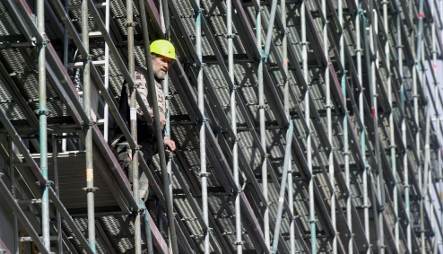The Ifo indicator edged down to 82.6 points from 83 points in January, the Munich-based economics research institute said.
Analysts polled by Dow Jones Newswires had expected the indicator to remain essentially unchanged.
The February level came in just below the revised level of 82.7 points in December, the previous all-time low, which had initially been reported as 82.6 points as well.
“The worsening of the business situation that has been going on for months has continued in February,” Ifo president Hans-Werner Sinn said in a statement.
He added however that those companies surveyed are again less pessimistic regarding the business outlook for the coming six months. Firms nonetheless remained “basically sceptical,” he said, adding that “on the whole the survey results do not signal a cyclical turning point” in the worst German recession since World War II, Sinn said.
A sub index that measures the current business situation dropped to 84.3 points from 86.8 in the previous month, hitting a six-year low, while expectations for the coming six months edged up to an indexed 80.9 from 79.5.
Some analysts suggest the latter reading indicates that company executives feel the German economy could be nearing the low point of a recession that began in the second and third quarters of 2008.
Broken down by sectors, the current situation was assessed less favourably by manufacturers, though the six-month outlook “has been appraised slightly less negatively,” Ifo said.
Wholesalers were more cautious regarding both timeframes.
Improvements in both the current situation and six-month outlook were seen however among retailers and those in the construction industry.
Among auto distributors, a German government incentive that encourages drivers to turn in old clunkers for new cars “seems to be having an effect,” the statement said.
For Capital Economics economist Jennifer McKeown however, the overall fall in February “is a slight disappointment.”
“However, it is at least vaguely encouraging that the index has been broadly stable over the past three months following previous sharp falls,” McKeown added.
She pointed also to the rise in business expectations for the second month running, and noted that it mirrored similar increases in an index of investor sentiment compiled by the ZEW economic institute.
But with the current situation index falling to its lowest level since January 2003, German industrial output would likely “go on falling pretty rapidly at the start of this year at least,” the economist said.
She forecast that German gross domestic product would contract by around 3.0 percent this year.
Berlin believes Europe’s biggest economy will shrink by between two and two-and-a-half percent this year, which would be the country’s worst recession in six decades.



 Please whitelist us to continue reading.
Please whitelist us to continue reading.